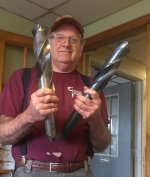5030
Epic Contributor
- Joined
- Feb 21, 2003
- Messages
- 24,595
- Location
- SE Michigan in the middle of nowhere
- Tractor
- Kubota M9000 HDCC3 M9000 HDC
Guess it all depends on how much scrap, broken tooling and mishaps you want to make.. YT is nothing more than a conglomeration of people who, for the most part don't know what they are doing. Some do, most don't For me YT is strictly entertainment.As for proper education like 5030 said, I'm gonna give some pushback on that. Define proper. In my humble opinion, youtube and just time spent on the machine is proper enough to get going.
